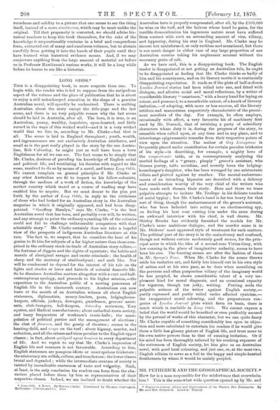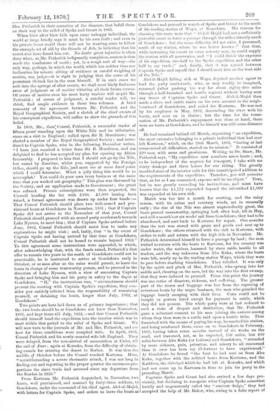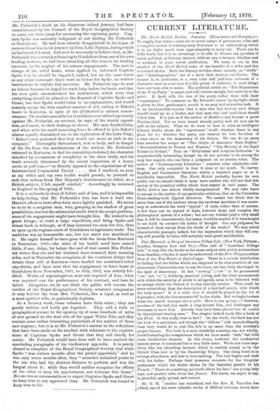MR. PETHERICK AND THE GEOGRAPHICAL SOCIETY.* How far is a
man responsible for the misfortunes that overwhelm him ? This is the somewhat wide question opened up by Mr. and
• Travels in Central Africa and Explorations of the Western Nile Tributaries. By Mr. and Mrs. Petherick. London: Tinsley.
Mrs. Petherick in their narrative of the disasters that befell them on their way to the relief of Speke and Grant in 1861.
When blow after blow falls upon some unhappy individual, the world at large briefly says it must be his own fault ; and even in his private lesser world there will not be wanting some to follow the example set of old by the friends of Job, in believing that his secret sins have found him out. No doubt great injustice is often done when, as_Mr. Petherick indignantly complains, success is thus made the touchstone of merit ; yet, in a rough sort of way—the only way, perhaps, in which the world, which has neither time nor inclination for minute sifting of evidence or careful weighing of motive, can judge—it is right in judging that the cause of his persistent ill-luck lies in the man himself. If in such cases we seek into the springs of after events, we shall most likely find some error of judgment or of motive vitiating all their future course. Of errors of motive even his most hasty readers will acquit Mr.
Petherick ; of errors of judgment, a careful reader will, we think, find ample evidence in these two volumes. A brief summary of the agreement between Mr. PethericL• and the Royal Geographical Society, and a sketch of the chief events of his consequent expedition, will suffice to show the grounds of this belief.
In 1859, Mr., then: Consul, Petherick, a successful trader of fifteen years' standing upon the White Nile and its tributaries, came on a visit to England ; called upon Sir It. Murchison ; was elected a member of the Royal Geographical Society ; and intro- duced to Captain Speke, who in the following December writes, "I have just received a letter from Sir R. Murchison, and am delighted to find he has accepted my plan for opening up Africa favourably. I proposed to him that I should not go up the Nile, but round by Zanzibar, whilst you, supported by the Foreign Office, should go up the Nile,;and meet me at some fixed point which I could determine. What a jolly thing this would be to accomplish ! You could do your own ivory business at the same time that you worked out geography." This plan was discussed by the Society, and an application made to Government ; the grant was refused. Private subscriptions were then requested, the Council heading the list with £100. £1,000 having been raised, a formal agreement was drawn up under four heads :- That Consul Petherick should place two well-armed and pro- visioned boats at Gondokoro in November, 1861 ; that if Captain Speke did not arrive in the November of that year, Consul Petherick should proceed with an armed party southwards towards Lake Nyanza, to meet him ; that if Captain Speke arrived before June, 1862, Consul Petherick should assist him to make any explorations he might wish ; and, lastly, that " in the event of Captain Speke not having arrived by that time at Gondokoro, Consul Petherick shall not be bound to remain beyond 1862." To this agreement some instructions were appended, in which, after acknowledging that, with the funds raised, Petherick's first offer to remain two years to the south of Gondokoro could not be practicable, he is instructed to arrive at Gondokoro early in October, or as soon after as the rains would permit, to leave the boats in charge of some trustworthy person, and to proceed in the direction of Lake Nyanza, with a view of succouring Captain Speke and bringing him and his party in safety to the depot at Gondokoro. "If," the instructions run, "circumstances should prevent the meeting with Captain Speke's expedition, they con- sider you entirely relieved from the responsibility of remaining yourself, or detaining the boats, longer than July, 1862, at Gondokoro."
Two points are here laid down as of primary importance ; that the two boats should be at Gondokoro not later than November, 1861, and kept there till July, 1862, —and that Consul Petherick should himself head the expedition into the interior which was to start within that period to the relief of Speke and Grant. We will now turn to the journals of Mr. and Mrs. Petherick, and see how far these conditions were complied with. In April, 1861, Consul Petherick and his newly-married wife left England. They were delayed, from the non-arrival of ammunition at Cairo, till the end of June ; again at Korosko, from the difficulty of obtain- ing camels for crossing the desert to Berber. It was thus the middle of October before the Consul reached Kartoum. Here, "notwithstanding a severe rheumatic attack, I was not long in finding out and reporting to the proper quarter the enormous pro- portions the slave trade had assumed since my departure from the Soudan in 1859."
From Kartoum Mr. Petherick despatched, in November, two boats, well provisioned, and manned by forty-three soldiers, to Gondokoro, under the command cf his chief agent, Abd-el-Majid, with letters for Captain Speke, and orders to leave the boats at Gondokoro and proceed in search of Speke and Grant to the south of his trading station of Wayo, or Neambara. His reasons for choosing this route were that " Abd-i1-31ajid had not a sufficiently powerful escort to force a passage through the tribes directly south of Gondokoro ; but the same difficulty did not exist, I presumed, south of my station, where he was better known ;" that thus, while increasing his escort to sonic seventy men, he could supply the station with all necessaries, and " 1 could divide the expenses of his expedition, one-half to the Speke expedition and the other half to my trade ;" and, finally, that it was agreed between Captain Speke and myself that I should meet him on the west side of the Nile."
Abd-il-Majid falling sick at Wayo, deputed another agent to lead the party southwards, who, as may readily be imagined, returned (after pushing his way for about eighty-five miles through a half-famished and hostile region) without having seen any traces of Captains Spoke and Grant. Abd-i1-.Majid then made a slave and cattle razzia on his own account iu the neigh- bourhood of Gondokoro, and sailed for Kartoutn. He was met by his employer in May, 1862, descending the river with his booty, and sent on in chains ; but the time for the termi- nation of Mr. Petherick's engagement was close at hand, there were no boats at Gondokoro, and he himself was still some distance off.
He had remained behind till March, organizing " au expedition, the most extensive belonging to a private individual that had ever left Kartoum," which, on the 28th March, 1862, " having at last surmounted all difficulties, started on its mission." It consisted of 220 men, with arms and provisions. Writing to Dr. Shaw, Mr. Petherick says, "My expedition now numbers seven boats ; and, to be independent of the negroes for transport, I take with me thirty donkeys and three horses for our riding. The greatly troubled state of the interior calls for this unanticipated addition to the requirements of the expedition. Therefore, you will perceive that, as far as I am concerned, expense will be no object." True, but lie was greatly exceeding his instructions, and must have known that the £4,172 expended beyond the subscribed £1,000 was expended at his own risk.
March was too late a month for starting, and the rainy season, with its calms and contrary winds, set in unusually early ; the rise of the Nile was almost unprecedeutly great, the boats proved unseaworthy, springing leak after leak, till in May, and still a month's or six weeks' sail from Gondokoro, they had to be abandoned, and sent back to Kartoum for repair. One sounder than the rest was stored with grain and goods and sent up to Gondokoro ; the others returned with the sick to Kartoum, with orders to refit and return with the high tide in November. Mr. Petherick determined himself to force a passage by land ; the men wished to return with the boats to Kartoum, for the country was under water, the natives, harassed by slave raids, hostile to all traders, and the way unknown from Abu Kuka, where the boats were left, nearly up to the trading station Wayo, which they were to pass before reaching Gondokoro. They rebelled. It was only by the spirit and pluck of Mrs. Petherick, who sprang into her saddle and, cheering on the men, led the way into the first swamp, that they were induced to proceed. From this point the journey was one series of disasters, sickness, and suffering. The greater part of the stores and baggage was lost from the capsizing of seventeen boats by the negro boatmen, the men who guarded the luggage barely escaping with their lives. Corn could not be bought or porters hired except for payment in cattle, which they did not possess. The whole party were at last reduced to such a state of despair and destitution, that Mr. Petherick gave a reluctant consent to his men joining the natives among whom they then were in a cattle raid upon a hostile tribe. Thus furnished with the means of paying his way, he reached his station, and being reinforced there, came on to Gondokoro in February, 1863, having taken seven months instead of six weeks on the road, and traversed, not, as he expected, 150 miles, but 400 miles between Abu Kuka (or Loluun) and Gondokoro, "attended by more sickness, pain, privation, and misery to all concerned than it ever has been my ill-fortune to have experienced.' At Gondokoro he found " the boat he had sent on from Abu Kuka, together with the refitted boats from Kartoum, and the Kathleen, the daltabyelt which he had left at Korosko, and which had not come up to Kartoum in time to join his party in the preceding March.
Captains Speke and Grant had also arrived a few days pre- viously, but declining to recognize what Captain Speke somewhat hastily and ungenerously called the " succour dodge," they had accepted the help of Mr. Baker, who, owing to a false report of
Mr. Petherick's death on his disastrous inland journey, had been commissioned by the Council of the Royal Geographical Society to carry out their plans for succouring the exploring party. Cap- tain Speke was naturally indignant at not finding Mr. Petherick at Gondokoro. He had been already disappointed in his hopes of succour from him in his journey up from Lake Nyanza, during which he bad needed it most. And now he was ready to believe that, as Mr. Petherick was certainly advancing to Gondokoro from one of his own trading stations, he had been attending all this time to his trading interests, to the neglect of his solemn engagements. The men in charge of the relief boats, when applied to, informed Captain Spoke that he should be supplied, indeed, but on the same terms as any other customer ; there were no letters for Speke, no written instructions to confute this assertion. Mr. Petherick says he sent no letters because he hoped to reach long before his boats, and that his men quite misunderstood his instructions, which were that everything should be placed at the disposal of Captains Spoke and Grant, but that Speke would listen to no explanations, and would scarcely accept the very smallest amount of aid, sailing in Baker's boats to Kartoum, in spite of his (Petherick's) earnest remon- strances. The traders assembled at Gondokoro now stirred up enmity against Mr. Petherick, on account, he says, of his steady opposi- tion, as Consul, to their dealings in slaves. His men deserted him, and when with his small remaining force he offered to join Baker's almost equally diminished one in the exploration of the Luta Nzigi, Baker's men protested that they would not move an inch in my company." Thoroughly disheartened, sick in body, and in danger of his life from the machinations of the traders, Mr. Petherick returned to Kartoum, to find his consulship abolished, his character attacked by accusations of complicity in the slave trade, and his trade severely threatened by the recent imposition of a heavy werko or poll-tax,—" so directly opposed to the stipulations of the International Commercial Treaty . . . . that I resolved, as soon as my wife's and my own health would permit, to proceed to seek that redress from Her Majesty's Government to which, as a British subject, 1 felt myself entitled." Accordingly he returned to England in the spring of 1865.
It is a melancholy story of failure and of loss, and it is impossible to help feeling that Mr. Petherick's fate has been a hard one. Heavier offences have often been more lightly punished. He seems to us to be a sanguine man, who, grasping at the shadow of great possibilities, has lost the substantial credit which the simple perform- ance of his engagement might have brought him. He wished to do great things ; to bead a large expedition, and bring Spoke and Grant back in triumph, or if they returned too soon for this, then to open up the regions south of Gondokoro to legitimate trade. The ambition was an honourable one, but too much was sacrificed to it He ought himself to have gone with the boats from Kartoum in November, 1861—the state of his health need have caused little, if any, delay, for before the end of that month Mrs. Pether- ick writes that she and her husband have resumed their morning rides, and in December she complains of the vexatious delays that detain them still at Kartoum—have headed the southward relief expedition, and have seen that his engagement to leave boats at Gondokoro from November, 1861, to July, 1862, was strictly ful- filled. Works of supererogation were not required of him ; what was required was the performance of his contract, and here he failed. Altogether, we do not think the public will reverse the verdict of the Royal Geographical Society, whatever compassion it may feel for the woes Mrs. Petherick, like a loyal, as well as a.most spirited wife, so pathetically deplores.
As a literary work, these volumes have little value ; they are poorly written and badly put together. They add a little to geographical science in the opening up of some hundreds of miles of new ground on the west side of the upper White Nile, and they contain some rather interesting particulars of the natives of those new regions ; but it is as Mr. Petherick's answer to the reflections that have been made on his conduct with reference to the explora- tions of Captains Speke and Grant that they call chiefly for notice. Mr. Petherick would have done well to have omitted the concluding paragraphs of his vindicatory appendix. It is purely absurd to complain of the Royal Geographical Society that while Speke "was sixteen months after the period appointed," and he was• only seven months after, they " accorded unlimited praise to the one who had the shortest distance to perform and was the longest about it ; while they would neither recognize the efforts of the other to keep his appointment, nor welcome him home." No one was so unreasonable as to expect Captains Speke and Grant to keep true to any appointed time. Mr. Petherick was bound to .keep true to his.




































 Previous page
Previous page